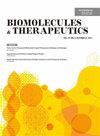Unlocking the Therapeutic Potential of BCL-2 Associated Protein Family: Exploring BCL-2 Inhibitors in Cancer Therapy.
IF 3
3区 医学
Q2 PHARMACOLOGY & PHARMACY
引用次数: 0
Abstract
Apoptosis, programmed cell death pathway, is a vital physiological mechanism that ensures cellular homeostasis and overall cellular well-being. In the context of cancer, where evasion of apoptosis is a hallmark, the overexpression of anti-apoptotic proteins like Bcl2, Bcl-XL, and Mcl-1 has been documented. Consequently, these proteins have emerged as promising targets for therapeutic interventions. The BCL-2 protein family is central to apoptosis and plays a significant importance in determining cellular fate serving as a critical determinant in this biological process. This review offers a comprehensive exploration of the BCL-2 protein family, emphasizing its dual nature. Specifically, certain members of this family promote cell survival (known as anti-apoptotic proteins), while others are involved in facilitating cell death (referred to as pro-apoptotic and BH3-only proteins). The potential of directly targeting these proteins is examined, particularly due to their involvement in conferring resistance to traditional cancer therapies. The effectiveness of such targeting strategies is also discussed, considering the tumor's propensity for anti-apoptotic pathways. Furthermore, the review highlights emerging research on combination therapies, where BCL-2 inhibitors are used synergistically with other treatments to enhance therapeutic outcomes. By understanding and manipulating the BCL-2 family and its associated pathways, we open doors to innovative and more effective cancer treatments, offering hope for resistant and aggressive cases.释放 BCL-2 相关蛋白家族的治疗潜力:探索BCL-2抑制剂在癌症治疗中的应用。
细胞凋亡(程序性细胞死亡途径)是确保细胞平衡和细胞整体健康的重要生理机制。在癌症中,逃避细胞凋亡是一个标志,而 Bcl2、Bcl-XL 和 Mcl-1 等抗凋亡蛋白的过度表达已被证实。因此,这些蛋白已成为有希望的治疗干预靶点。BCL-2 蛋白家族是细胞凋亡的核心,在决定细胞命运方面发挥着重要作用,是这一生物过程中的关键决定因素。本综述全面探讨了 BCL-2 蛋白家族,强调了其双重性质。具体来说,该家族的某些成员促进细胞存活(称为抗凋亡蛋白),而其他成员则参与促进细胞死亡(称为促凋亡蛋白和纯 BH3 蛋白)。我们研究了直接靶向这些蛋白的潜力,特别是因为它们参与了传统癌症疗法的抗药性产生。考虑到肿瘤的抗凋亡通路倾向,还讨论了此类靶向策略的有效性。此外,该综述还重点介绍了新出现的联合疗法研究,即 BCL-2 抑制剂与其他疗法协同使用,以提高治疗效果。通过了解和操纵BCL-2家族及其相关通路,我们为创新和更有效的癌症治疗打开了大门,为耐药和侵袭性病例带来了希望。
本文章由计算机程序翻译,如有差异,请以英文原文为准。
求助全文
约1分钟内获得全文
求助全文
来源期刊
CiteScore
6.60
自引率
8.10%
发文量
72
审稿时长
6-12 weeks
期刊介绍:
Biomolecules & Therapeutics (Biomolecules & Therapeutics) (Print ISSN 1976-9148, Online ISSN 2005-4483) is an international, peer-reviewed, open access journal that covers pharmacological and toxicological fields related to bioactive molecules and therapeutics. It was launched in 1993 as "The Journal of Applied Pharmacology (ISSN 1225-6110)", and renamed "Biomolecules & Therapeutics" (Biomol Ther: abbreviated form) in 2008 (Volume 16, No. 1). It is published bimonthly in January, March, May, July, September and November. All manuscripts should be creative, informative, and contribute to the development of new drugs. Articles in the following categories are published: review articles and research articles.

 求助内容:
求助内容: 应助结果提醒方式:
应助结果提醒方式:


